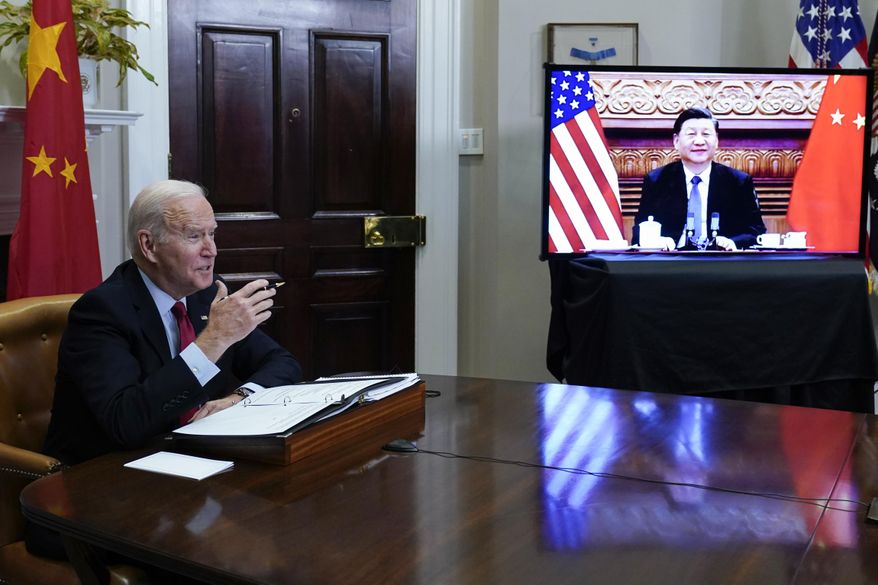The virtual meeting between US President Joe Biden and the Chinese leader Xi Jinping last week may cause some concern for India as it cannot be good news if the USA gravitates towards China or vice versa. Since China has been persistently creating border tension through its open and secret attempts to encroach Indian territory, any closeness between the two will mean bad news for India. But, the fallout of the video conference shows that the relationship between the two countries remains as tense as before. Xi did not agree with Biden’s charge of China’s human rights violation in Xinjiang, Tibet and Hong Kong and threat to take Taiwan by force. Xi from his side urged Biden to reduce the risk of conflict and suggested cooperation. The two leaders discussed the complex nature of relations between their countries and the importance of managing competition responsibly. President Biden emphasised that the USA would continue to stand up for its interests and values and work with its allies and partners for putting in place an international system that is free, open, and fair.
What should be music to Indian ears is Biden’s unequivocal support for a free and open Indo-Pacific region and the US commitments there. This is a reference to the recent AUKUS defence pact signed by Australia, the UK and the USA and the nuclear-powered submarine deal between the USA and Australia to checkmate China’s Indo-Pacific ambitions.
As is reported, the way the three-and-a-half hour-long talk progressed, it appears that Biden did not have the bargaining chip and he could not negotiate from a position of strength following the fiasco in Afghanistan, the success of China, Russia and Pakistan in bringing the Taliban within their orbit of influence and the loosening grip of the Democrats in the US domestic politics.
Predictably enough, Biden voiced concerns about cyberattacks, economic coercion of allies, China’s activities in the East and South China Seas and across the Taiwan Strait, technology pilferage, unfair trade practices and its unwillingness to cooperate with WHO on identifying Covid-19’s origins. Curiously enough, this litany of complaints does not appear to have made much impact on Xi as all these accusations and complaints had been dismissed with disdain by China at the Alaska meeting in March between the US Secretary of State Antony Blinken and China’s diplomat and Communist Party of China Politburo member Yang Jiechi.
The question is why, then, was Biden so keen on holding the parley with Xi. Reports so far indicate that Xi, who is believed to be in no mood to leave China at the moment fearing intra-party tussle going out of hand which could possibly put him in a precarious position, lapped up the opportunity of a virtual engagement for his own gain. He seems to have fully exploited the exchange to consolidate his position at home, enhance his strongman image and build confidence in his domestic audience that he alone can take on the US. The proof is the contrast between the White House’s 426-word readout of the talks against China’s 2,770-word account. The burden of the Chinese document was that Xi had spoken to Biden from a position of confidence and strength. There is not a word on whether China is answerable in any way for the problems that have arisen between the two countries. It is as if all fault lies on America’s doort and it is for America to fix them.
On the other hand, according to the US version, Biden spoke of managing the US-China competition responsibly and expressed his resolve to stand by the US allies, while raising the human rights violations by China. What punctures the US’ pride is the Chinese assertion that it is for Biden to demonstrate political leadership and steer America’s China policy back on track of reason and pragmatism. The implication is China has nothing to do in this regard because the situation is US’ creation.
To rub salt into Biden’s injuries, Xi even laid out three vague principles, a road map for improving US-China relationship – mutual respect, peaceful coexistence, which means respecting each other’s core interests, and win-win cooperation. These are ploys to obfuscate the real issues of China’s attitude of hegemony. He also explained no problems can be solved without China-US cooperation and invited the US to join China’s global initiatives, including its Belt and Road Initiative (BRI). These only point to China’s position that the US-China ties can be normalised on China’s terms.
It appears Biden had little option but to hold the dialogue with Xi as he needed a major event to divert the attention of the world and his domestic constituency from the failure in Afghanistan and change the gear of his foreign policy narrative towards China. The dip in his party’s popularity rating and recent defeat of the Democrats in key states prompted him to meet Xi even if it offered advantage to China.
The future will tell whether the price paid by the US due to the talks will yield any worthwhile political result for Biden domestically.
